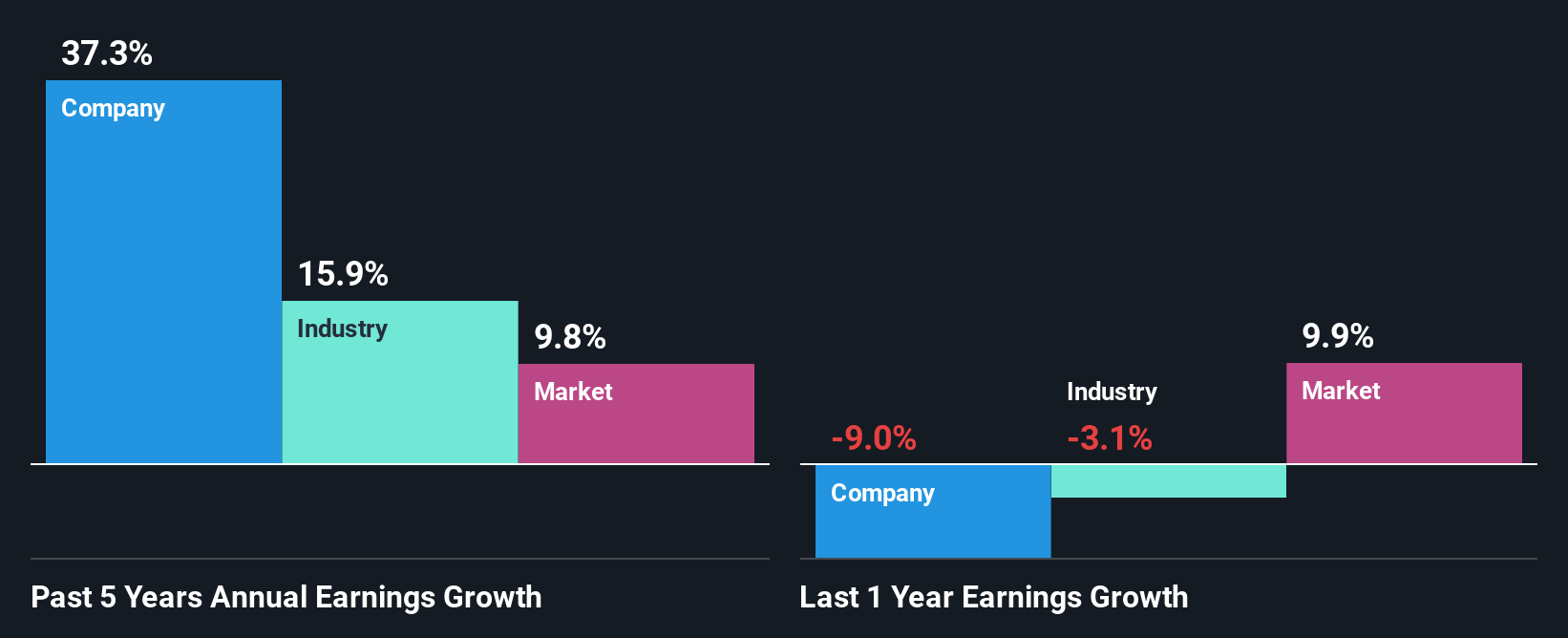- United States
- /
- Machinery
- /
- NasdaqCM:TAYD
Are Robust Financials Driving The Recent Rally In Taylor Devices, Inc.'s (NASDAQ:TAYD) Stock?
Taylor Devices (NASDAQ:TAYD) has had a great run on the share market with its stock up by a significant 18% over the last month. Given that the market rewards strong financials in the long-term, we wonder if that is the case in this instance. Specifically, we decided to study Taylor Devices' ROE in this article.
ROE or return on equity is a useful tool to assess how effectively a company can generate returns on the investment it received from its shareholders. In simpler terms, it measures the profitability of a company in relation to shareholder's equity.
How To Calculate Return On Equity?
Return on equity can be calculated by using the formula:
Return on Equity = Net Profit (from continuing operations) ÷ Shareholders' Equity
So, based on the above formula, the ROE for Taylor Devices is:
14% = US$8.9m ÷ US$64m (Based on the trailing twelve months to August 2025).
The 'return' is the yearly profit. One way to conceptualize this is that for each $1 of shareholders' capital it has, the company made $0.14 in profit.
See our latest analysis for Taylor Devices
Why Is ROE Important For Earnings Growth?
We have already established that ROE serves as an efficient profit-generating gauge for a company's future earnings. We now need to evaluate how much profit the company reinvests or "retains" for future growth which then gives us an idea about the growth potential of the company. Generally speaking, other things being equal, firms with a high return on equity and profit retention, have a higher growth rate than firms that don’t share these attributes.
Taylor Devices' Earnings Growth And 14% ROE
At first glance, Taylor Devices seems to have a decent ROE. Further, the company's ROE compares quite favorably to the industry average of 11%. This certainly adds some context to Taylor Devices' exceptional 37% net income growth seen over the past five years. We believe that there might also be other aspects that are positively influencing the company's earnings growth. For instance, the company has a low payout ratio or is being managed efficiently.
Next, on comparing with the industry net income growth, we found that Taylor Devices' growth is quite high when compared to the industry average growth of 16% in the same period, which is great to see.

The basis for attaching value to a company is, to a great extent, tied to its earnings growth. What investors need to determine next is if the expected earnings growth, or the lack of it, is already built into the share price. This then helps them determine if the stock is placed for a bright or bleak future. What is TAYD worth today? The intrinsic value infographic in our free research report helps visualize whether TAYD is currently mispriced by the market.
Is Taylor Devices Making Efficient Use Of Its Profits?
Given that Taylor Devices doesn't pay any regular dividends to its shareholders, we infer that the company has been reinvesting all of its profits to grow its business.
Conclusion
On the whole, we feel that Taylor Devices' performance has been quite good. Specifically, we like that the company is reinvesting a huge chunk of its profits at a high rate of return. This of course has caused the company to see substantial growth in its earnings.
Valuation is complex, but we're here to simplify it.
Discover if Taylor Devices might be undervalued or overvalued with our detailed analysis, featuring fair value estimates, potential risks, dividends, insider trades, and its financial condition.
Access Free AnalysisHave feedback on this article? Concerned about the content? Get in touch with us directly. Alternatively, email editorial-team (at) simplywallst.com.
This article by Simply Wall St is general in nature. We provide commentary based on historical data and analyst forecasts only using an unbiased methodology and our articles are not intended to be financial advice. It does not constitute a recommendation to buy or sell any stock, and does not take account of your objectives, or your financial situation. We aim to bring you long-term focused analysis driven by fundamental data. Note that our analysis may not factor in the latest price-sensitive company announcements or qualitative material. Simply Wall St has no position in any stocks mentioned.
About NasdaqCM:TAYD
Taylor Devices
Designs, develops, manufactures, and markets shock absorption, rate control, and energy storage devices for use in machinery, equipment, and structures in the United States, Asia, and internationally.
Flawless balance sheet and fair value.
Similar Companies
Market Insights
Community Narratives



